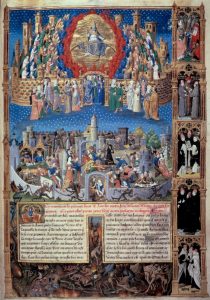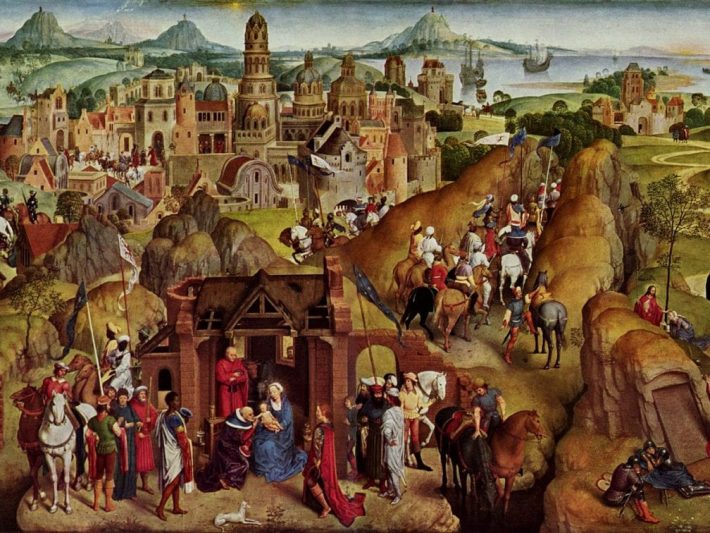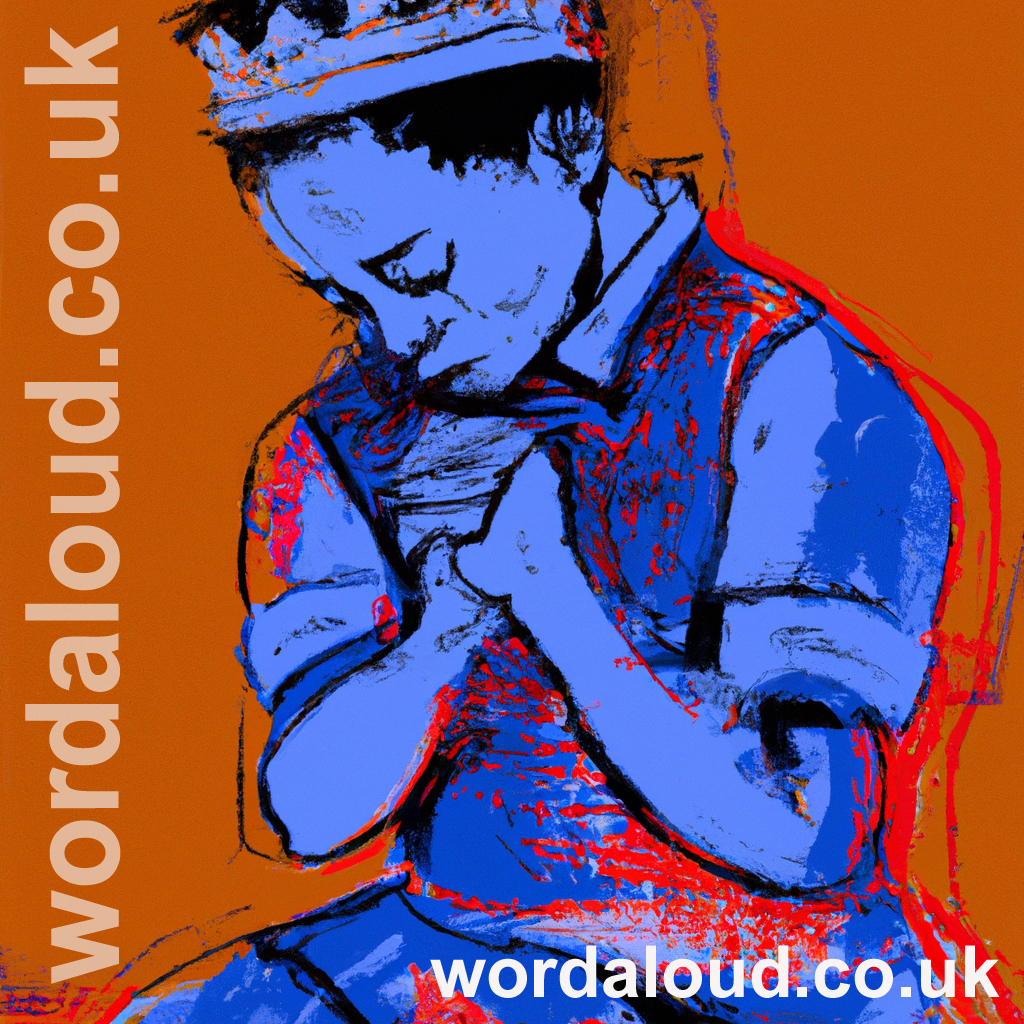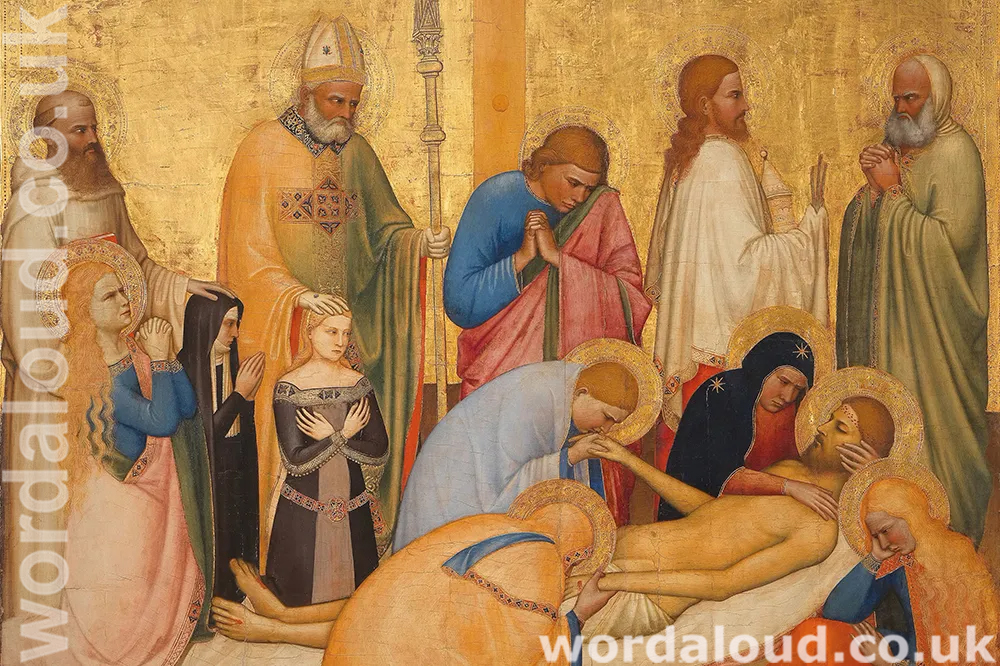Christian Art | Jesus Christ Is Born
Office Of Readings | Week 28, Friday, Ordinary Time | A Reading From The Book Of Saint Augustine The City Of God | In Every Place There Is A Sacrifice And A Clean Oblation Offered To My Name
‘In every place there is a sacrifice and a clean oblation offered to my name.’
In The City Of God, Saint Augustine defines the nature of true sacrifice and its relation to union with God. He distinguishes outward ritual from inward intention: a sacrifice is not simply an act performed, but a work directed to God as its final end. Its purpose is communion with the divine and the attainment of true happiness, which consists in clinging to God.
Acts of mercy, whether towards oneself or others, are authentic sacrifices only when they are done for God’s sake. To ‘have mercy on one’s soul’ means to live in a way that pleases God, turning from the world to divine life. Thus, moral and spiritual actions belong to worship when they express love for God and are ordered to God.
Augustine extends this understanding to the whole community of the redeemed. The ‘city of God’, the fellowship of the saints, becomes a single universal sacrifice. This is made possible through Christ, the mediator and high priest, who in his humanity offered himself once for all. In offering his human nature, he consecrated it, and through it the Church becomes his body — sharing in his self-offering to the Father.
Paul’s exhortation in Romans 12 frames the moral consequence of this theology: believers are to present their bodies as a living sacrifice, holy and pleasing to God. Such self-offering is ‘spiritual worship’ — the continual alignment of life with divine will. Transformation of mind and heart replaces conformity to the world’s patterns. The sacrifice is total: the giving of oneself to God in thought, word, and action.
In this renewed humanity, the diversity of gifts within the Church does not divide but unites. As many members form one body, their varied functions contribute to a single act of worship. This unity finds visible expression in the Eucharist, the sacrament in which the Church’s identity as Christ’s body is both signified and enacted. In celebrating the sacrifice, the Church realises that she herself is what is offered — the community of believers participating in the one sacrifice of Christ.

A Reading From The Book Of Saint Augustine The City Of God | In Every Place There Is A Sacrifice And A Clean Oblation Offered To My Name
Every work that effects our union with God in holy fellowship is a true sacrifice; every work, that is, which is referred to that final end, that ultimate good, by which we are able to be in the true sense happy. As a consequence even that mercy by which aid is given to man is not a sacrifice unless it is done for the sake of God. Sacrifice, though performed or offered by man, is something divine; that is why the ancient Latins gave it this name of ‘sacrifice,’ of something sacred. Man himself, consecrated in the name of God and vowed to God, is therefore a sacrifice insofar as he dies to the world in order to live for God. This too is part of mercy, the mercy that each one has for himself. Scripture tells us: Have mercy on your soul by pleasing God.
Works of mercy, then, done either to ourselves or to our neighbor and referred to God are true sacrifices. Works of mercy, however, are performed for no other reason than to free us from wretchedness and by this means to make us happy (and we cannot be happy except through that good of which Scripture speaks: It is good for me to cling to God). It clearly follows that the whole redeemed city, that is, the assembly and fellowship of the saints is offered to God as a universal sacrifice through the great high priest, who in the nature of a slave offered even himself for us in his passion, in order that we might be the body of so great a head. He offered this nature of a slave; he was offered in that nature, because in that nature he is the mediator, in that nature he is the high priest, in that nature he is the sacrifice.
The Apostle urges us to present our bodies as a living sacrifice, holy and pleasing to God, and as our spiritual worship, and not to follow the pattern of this world but to be transformed by the renewal of our minds and hearts, so that we may discern what is the will of God, what is good and pleasing and perfect, the total sacrifice that is ourselves. By the grace of God that has been given me, he says, I say to all who are among you: Do not think more highly of yourselves than you should, but judge yourselves with moderation according to the measure of faith God has given to each of you. As we have in the same body many members, yet all the member do not have the same functions, so we are many, but are one body in Christ; we are each of us members of one another, having different gifts according to the grace that has been given us.
This is the sacrifice of Christians, the many who are one body in Christ. This is the sacrifice which the Church celebrates in the sacrament of the altar, that sacrament known to the faithful; in that sacrament it is made clear to the Church that in the sacrifice she offers, she herself is offered.
Christian Prayer With Jesus
Lord God,
you call your people to offer themselves in union with Christ,
the one priest and sacrifice.
Grant that all our works may be ordered to your glory,
that mercy, service, and prayer may become offerings of love.
Renew our minds and hearts,
that the Church may be a living sacrifice,
a city of God,
holy and acceptable to you,
through Jesus Christ our Lord.
Amen.
Glossary Of Christian Terms
Sacrifice – Any act directed to God for the sake of union with him; in Augustine’s definition, a sacred work oriented to the final good.
Mercy – Compassion expressed in action; in this context, both care for others and the ordering of one’s own life towards God.
Mediator – Christ in his human nature, who unites humanity and divinity through his self-offering.
Living Sacrifice – The life of the Christian offered wholly to God, as described in Romans 12:1.
City of God – Augustine’s term for the community of the redeemed, united in love of God and destined for eternal fellowship with him.
Eucharist (Sacrament of the Altar) – The ritual act in which the Church makes present Christ’s sacrifice and recognises herself as offered with him.








